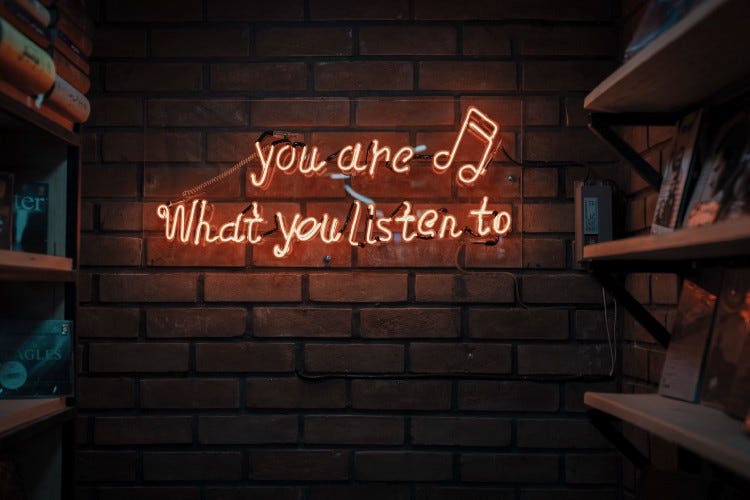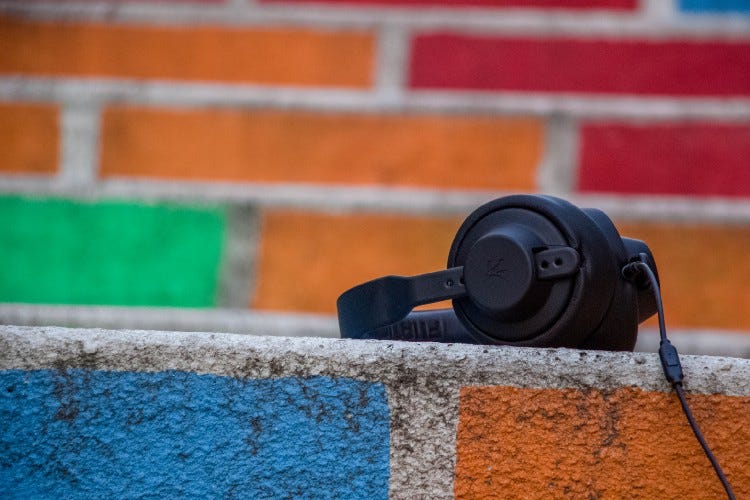Your Music Taste Says a Lot About You
Some people say you like what you like and that's that. Not me.
I love music: listening to it, playing it, educating myself about it, exploring obscure nooks and crannies of it, thinking about it, talking about it. And the thing about being Very Into something that nearly everyone’s Somewhat Into is that sooner or later you have to decide what attitude you’re going to take towards the Casual Enjoyers. You can become a snob who looks down on people who only like what happens to be current or popular. You can view the casual enjoyers as Normal People and yourself as a Harmless Eccentric. Or you can just say ‘They like what they like to the extent they like it, I like what I like to the extent I like it, end of story.’
Of course being a snob is uncool and thinking of yourself as an eccentric isn’t much fun, so most people go for option 3. Or they think they do. But if you’re listening to Mahavishnu Orchestra or Angélique Kidjo and your friend walks by and says ‘What’s this shit?’, just watch how quickly your brain screams ‘Oh, this from an Ed Sheeran fan?!’
Where you get a passion for music combined with a decent general knowledge about it and a community that loves to argue about it, you get snobbery. It can’t be helped. The attitude never goes anywhere, it just changes targets: where rock snobs used to look down on teenage girl pop, now poptimists look down on dadrockers. Where ABBA used to be seen as embarrassingly silly, now the Eagles are seen as hopelessly low-rent. Where once disco sucked, now “disco sucks” sucks.
The targets may change, but there’s a common thread to a lot of snobbery: looking at someone’s taste and drawing all sorts of other conclusions about them on the basis of it. Ah, they have basic taste, that means they’re basic in general. Ah, they like country and hate rap, that means they’re subconsciously racist. Ah, they like Ted Nugent and hate Billie Eilish, that means they’re either a grouchy Boomer or a young reactionary (hard to tell from that profile avatar).
But in the blessed realms outside the articles I read and nerdy Facebook groups I join, I reckon the majority of listeners still have the attitude they’ve always had: live and let live. Whatever you listen to is fine by me. No judgements here.
This attitude generally involves not drawing psychological conclusions about others based on their taste: it’s all just air vibrating man, nothing to do with anything, why overthink things? Look at Rob Fleming from High Fidelity (the original Nick Hornby novel, not the disappointing movie), who only becomes reasonably well-adjusted after he transitions from Judging People Based on Their Records to Judging Them on Whether They’re Fun to Be Around. Or as Dara O’Briain puts it: ‘Music snobbery is the worst kind of snobbery. “Oh, you like those noises, those sounds, in your ear? Do you like them? They’re the wrong sounds. You should like these sounds.”’
The implication being that snobbery about movies or books makes some kind of sense, because some stories are better-told or more profound than others, while music is nothing more than meaningless “sounds”. Not worth making value judgements about.

The trouble is, music isn’t just sounds. The noise a kettle makes when you boil it is a sound, but it doesn’t make you cry. There’s something different going on with music, something that this particular way of organising sound represents to us, even if no-one can say exactly what’s happening, or why, or how. (I should know; I researched the subject fairly extensively for my Masters dissertation and I’m still none the wiser.)
But even if we don’t know why a fundamentally abstract, nonrepresentational, preverbal artform affects us emotionally, we all know that it does. In my opinion, that means you absolutely can speculate about people’s inner lives based on their music taste. Which isn’t to say people should be judged for what they listen to. But can you use their preferences to make certain tentative judgements about them? I think so. It’s just a matter of having the right attitude — not judgemental but empathetic, playful, curious: ‘Oh they like Janelle Monáe, I wonder if…Wait, they’re into Howlin’ Wolf? Ooh, that’s interesting…’
To me, this represents a sort of middle way between the music snob approach — smug, judgemental — and the typical “who cares” approach, which is nonjudgemental to a fault: it assumes that someone’s music taste suggests no psychological information about them worth knowing. Personally, I don’t feel this does justice to the fundamental interconnectedness of a person’s psychological makeup.1
Does the “middle way” approach imply that in theory, you could look at someone’s top 50 most-streamed artists on Spotify and proceed to describe what they did for a living, whether they were married or not and what they liked for breakfast, Sherlock Holmes-style? No, human nature is way too complex for that. But I find people’s tastes fascinating and illuminating providing I already know them well. If I already know, and preferably love, someone, knowing what they listen to fills out the picture a little more. It adds nuance and complexity, a fresh angle that helps me understand them better.
One of the main reasons you can’t start with the taste and extrapolate out to the personality is that a person’s music preferences express certain aspects of their personality far more than others. So you have to start with the personality, then notice how the taste fits in with some sides of it but leaves other sides strangely neglected. Hmm, my friend Chloe is the most vigorous person I know but listens exclusively to sad folk music, what’s going on there? And what about Frank, who has a huge chip on his shoulder but never listens to angry music? Is he threatened by his own rage, or maybe just sick of it? Does music give him a break from the constant grind of bitterness and disappointment? Is he listening aspirationally, somehow using music to viscerally reconnect him with a softer side, or push him up towards the light?
To me the interesting question is ‘What’s this person looking for music to do for them?’ Liven them up? Calm them down? Move them? Excite them? Cheer them up? Express their deepest feelings for them?
Speaking for myself, my music taste is fairly broad but I have clear biases. I love soul. I really love funk. Dylan and the Beatles; The Who and Hendrix; prog and punk (yes, both!). Uptempo African bops. Electro-pop. Dance. Beethoven. Clearly, vitality in music is important to me. And joy. You may also have noticed that my taste skews fairly heavily to the old-school. If the art you gravitate towards says something about your fundamental drives and aspirations, does that mean my obsession with the music of 1965 to ’75 makes me a millennial hippy who feels almost completely alienated from the way my own generation processes the world? Guilty as charged.
If I were to further armchair-psychoanalyse my own taste, I’d say that I frequently use music to wrench myself out of lethargy and pessimism and inject some energy into the day. I can imagine someone used to experiencing sadness as more of an almost-pleasant-melancholy choosing to wallow in the feeling and sticking on some Radiohead or Joy Division. But I subconsciously tell myself that melancholy would be all very well if it stopped there, but it too easily shades into bitterness and depression, which I don’t want to get into, so I need to orient myself the other way before it’s too late!! ‘Rise above, we gotta rise above!!!’
Speaking of which, I love the 1980s hardcore punk subgenre because it symbolises the externalisation of anger, something I’m trying to get better at. Slow, ominous music is the enemy because it reminds me of depression’s internalisation of anger, which is what I want to get away from. Placid, unemotive background music irritates the hell out of me because I want emotions, drama, an epic sweep, transcendence — to me that’s what the artform is for. Life is already full of boredom and emotional compromise without infecting music with it as well. If I want to relax, well, that’s what silence is for.
My point is that I’m drawn to my favourite music not just because it’s beautiful in itself but because it performs specific psychological functions for me. Plenty of other music is just as beautiful in itself, but it leaves me cold because it doesn’t hit any of my psychological targets. Those targets are bound to change as I get older and have new life experiences.
So for now I love aggressive music because it gives me a feeling of joy, freedom and release — finally, all those feelings are coming to the surface! This is good, this is healthy! — but who knows how I’ll feel in 20 or 50 years. Meanwhile, lots of people don’t like angry music because their own anger scares them, or because they associate music with pleasant emotions and prefer other conduits to express their darker side — or they release their anger directly rather than using conduits at all — or they just don’t have much anger in ’em. I imagine the Dalai Lama wouldn’t have much use for punk. Where I see freedom, he would just see the chains of ego.
Which means I can imagine five people hating this song for five different reasons — see what I mean about needing to know the person before you start guessing about why they like what they like? Whereas I love the track, because its vibe speaks to my particular concerns/stage of development/incarnation/karma. I can notice how different all these attitudes to the same song are, how incompatible they are and how spiritually and psychologically informative they are, without once making ethical judgements about any of the tastes involved. Or even aesthetic judgements, really. People are endlessly interesting, that’s all, and so is everything they like.

I could go on and on about this topic, but in the words of Pythagoras, ‘There’s only so much armchair psychologising about obscure punk tracks you can fit into one Medium post.’ Just for fun though, why not try a little thought experiment this week where you go through your four or five favourite artists in your head and see if you can use them to draw some juicy conclusions about yourself? How about the stuff your friends listen to? Are their favourite bands more or less what you’d expect them to be? If not, are the discrepancies interesting?
If you discover anything tasty about aesthetics or human nature in the process, why not leave me a comment below. Seems like the kind of research I should be made aware of.
If you liked this post then clicking the heart button might be a fresh and crispy thing to do; if you didn’t like it, the same action could be seen as vaguely dishonest (see how relative these things are?). Only share the post if you think it’ll benefit someone or you get some kind of financial reward. Your time is valuable.
For the record, I take the same “middle way” approach to people’s sexual kinks (as distinct from sexual orientation, which is a different ball of wax). Should people be judged for what they’re into? No. But does that mean that what they’re into is an entity unto itself, something that lives in its own corner of the brain, completely unrelated to all the other features that make up their psychology? I doubt it. I can back this view up with precisely nothing, and for all I know it’s what everyone already believes anyway, but I thought I might as well waste a footnote on it.







flamme en el l'obscurité . . . https://cwspangle.substack.com/p/flamme-en-el-lobscurite